Money Saving
If you find a broken link in this list, please report it to the webmaster.
iPhones aren’t MoneySaving, but if you’re going to get one anyway then check out our host of tricks to cut the cost of getting your hands on a new handset or
contract. 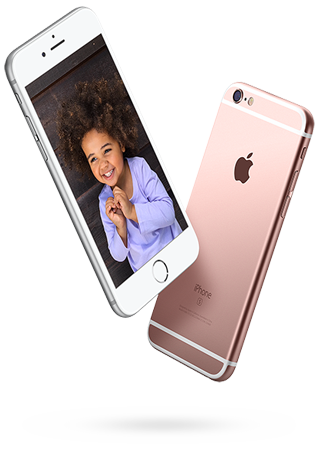
We’ve focused on Apple's flagship smartphones, the iPhone 6 and iPhone 6s, and the larger iPhone 6 Plus and iPhone 6s Plus. The iPhone 7 is rumoured to launch this September and we’ll have the latest tips when it arrives. If you’re looking for Samsung mobile tips, check out our Cheap Samsung guide.
Outright prices direct from Apple are £539 for the iPhone 6s, and £619 for the iPhone 6s Plus 16GB models. But which phone is best? And how do you choose the right contract?
Our iPhone need-to-knows should help you decide, as well as giving you some tips on selling your old phone and getting the most out of your current tariff.
iPhone top picks
We've picked out our top pick tariffs for the latest iPhone models, for a minimum 3GB data use and unlimited calls and texts. Please note that tariffs can change quickly so it's always worth checking what's out there before locking yourself in to a contract. Of course, if you want a different type of package then you’ll need to use a comparison site such as MobilePhoneChecker*.
Not sure what iPhone to go for? Take a look at find the right phone for you for help and full specifications.
Unld mins and texts, 3GB data: £25 upfront then £31.50/mth
MOBILES.CO.UK*
This two-year contract from O2 is one of the market's cheapest tariff at this usage level. You can get a new 16GB iPhone 6s for £25 upfront followed by £31.5$31.50 a month for 24 months, making it £781 for two years (monthly cost may increase each year in line with inflation).
The deal is for O2 newbies via Mobiles.co.uk* and comes with unlimited minutes and texts, and 3GB of 4G data. If you use up your data and need more, you'll need to buy a bolt-on starting at £3 for 100MB.
Find the right phone for you
Ask yourself what you really want from your phone, and what features are important to you. iPhones are popular and well-reviewed, but they aren't cheap - so getting one is a decision you should weigh up carefully.
Older iPhones often drop in price following the launch of a new model, so consider whether you really want the latest handset. Below, we've compared the features for each model.
Apple iPhone 6s
Apple iPhone 6s Plus
Apple iPhone 6
Apple iPhone 6 Plus
Watch out for annual inflationary price rises
Under Ofcom's rules, providers are permitted to increase the monthly cost of mobile contracts by as much as the rate of inflation each year, as long as they are upfront about this and warn you before you sign up. All the major networks (EE, O2, Three and Vodafone) now do this.
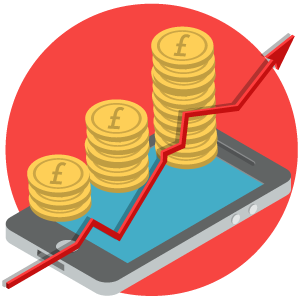
Adjustments are made in line with figures published in February each year based on the Retail Prices Index (a measure of inflation).
This year the RPI grew by 1.3% and most of the major networks put up customers' monthly payments by the full 1.3% - EE in March, O2 in April, and Vodafone in May. Any bill you received after those dates will have reflected the increase. Only Three opted to freeze pricing in May.
Match your tariff to your usage
According to BillMonitor, 76% of people are on the wrong contract. Use too few minutes, data or texts and you'll overpay for the contract each month. Yet go over your allowance and the extra charges are costly.
Analyse how many minutes, texts and how much data you're likely to use to get the right tariff. If you're new to smartphones, expect to use much more data than before. Here's a rough guide, based on figures from BillMonitor, to help you determine which type of user you are:
- Low user. Uses about 250 mins, 250 texts and 250MB of data per month
- Medium user. Uses about 500 mins, 500 texts and 1GB of data per month
- High user. Uses about 1,000 mins, 1,000 texts and 3GB of data per month
For info on how to calculate your exact usage, read the Cheap Mobiles guide.
Some deals are only available to 'new customers'
The deals you see here and on most comparison sites are geared towards new customers of the relevant network. If you're already with that network, even if your existing contract is up, and you try to get the deal then technically you'll be 'upgrading' rather than taking out a new contract, and you may have to pay more as a result.

Of course, you can still get the deal if you take out a separate new contract. But if you do, frustratingly you won't be able to directly transfer your existing number across to your new phone.
There is one possible way round this, though it's a bit of work. What you can do is get the deal on a separate new contract, and also get yourself a free pay-as-you-go Sim from a different network.
Port your existing number across to the free pay-as-you-go Sim, then port it again to the new contract once it's been set up. To port your number over you'll need to request a port authorisation code from your provider.
Buy a handset upfront and save
Unless you're a heavy user, a standalone handset with a Sim-only deal can often be the cheapest option. There are many one-month rolling contract Sim-only deals available, so you're not tied in, you only pay for what you use - see the top Sim-only deals for the best options.
Already have a Sim-only deal from an old phone?
Unless you buy a handset for that network, to put it in a new handset you'll need to "unlock" it from its pre-set network provider. For some phones this can be free, or it could cost up to £30 - for more info, see Mobile Unlocking.
You can get cheap handsets from retailers such as Argos or Play.com. Use the MegaShopBot to quickly compare prices.
Don't overestimate how much storage you need
All iPhone models come in different storage sizes, with the iPhone 6s and 6s Plus available in 16GB, 64GB and 128GB models. Generally, you'll pay about £80 to go up a size (if you're buying directly from Apple).

As a rule of thumb 16GB can hold around 3,500 songs or 20 hours of video, which is enough for some, though apps these days can take up quite a lot of space.
Unlike other smartphones, iPhones don't have memory card slots so you can't expand the storage if you decide you want more. However, be careful not to overestimate how much storage you'll need and go for a more expensive model 'just to be safe'.
We asked one of our techies, MSE Shrey for his top tips on saving storage space on your phone and paying less overall.
-
Free online storage. Apple gives iPhone users 5GB of storage space in iCloud for free. It isn't much, but there are lots of other providers that also offer free storage space and many have mobile apps. If you need more, email providers such as Gmail offer free storage space. You could sign up to several with mutiple email addresses and assign categories of content to each.
-
Stream instead of downloading. Music and video streaming services like Spotify (which is now free on mobile) and Netflix are all the rage and get rid of the need to download and store content on your phone. Streaming uses the same bandwidth as downloading, so do it when connected to wi-fi or it's costly. If you're streaming via 3G/4G, make sure you get the right tariff with a big enough data allowance.
-
Auto-upload to 'the Cloud'. Apps from some online storage providers, such as Dropbox, have settings to automatically upload your photos and videos, after which you can delete them from your phone without losing them. For music,iTunes Match (£21.99/yr) will store all your tracks on Apple's servers for you to access online.
-
Turn off automatic downloads. Content that automatically downloads to your device can take up more storage space than you realise. New purchases from the iTunes Store will sync to all of your iDevices with the same iCloud account, if they're set to do this. Turn off automatic downloads in Settings >> iTunes & App Store. Also, if you don't need to access older emails (especially if they have big attachments) while you're offline, you can reduce how many previous days' worth to store on your iPhone.
-
Clean up your apps. If you go to Settings >> General >> Usage in your iPhone, it'll show a breakdown of how much space your apps take up. Go through and get rid of those you no longer use and delete content you don't want anymore (eg, watched videos). You can download them again free if you paid for them - although you can't get back personal data once it's gone.
Think about whether you need 4G
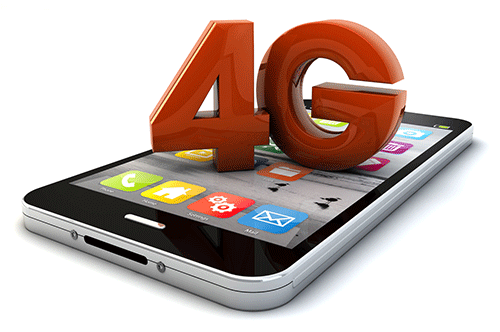
4G, also known as LTE or Long Term Evolution, is a lightning-quick internet connection for mobile devices. Networks claim that it's up to 5x faster than 3G, but Ofcom estimations say it's only twice as fast as 3G.
Check with your chosen provider whether you can actually get 4G where you live before signing up, and bear in mind that Ofcom says 4G and 3G performance differs between networks, with some outperforming others.
To get 4G, as well as being in an area that can receive a 4G signal, you’ll also need a 4G tariff and a 4G-compatible handset. The iPhone 5s, 5c, 6, 6 Plus, 6s and 6s Plus are all 4G-compatible.
Make sure you've the right size Sim
Daring to be different, Apple went against the grain with its iPhones, designing them to take a smaller Sim card.
 For the iPhone 4 and 4s (and its iPads), Apple adopted the smaller-than-standard-size "micro-Sim". With the launch of the iPhone 5 came the arrival of a yet smaller Sim card - the "nano-Sim". This is also used in the iPhone 5c, 5s, 6, 6 Plus, 6s and 6s Plus. Because it's a lot smaller, if you have an iPhone 4 or 4s you won’t be able to simply swap Sim cards.
For the iPhone 4 and 4s (and its iPads), Apple adopted the smaller-than-standard-size "micro-Sim". With the launch of the iPhone 5 came the arrival of a yet smaller Sim card - the "nano-Sim". This is also used in the iPhone 5c, 5s, 6, 6 Plus, 6s and 6s Plus. Because it's a lot smaller, if you have an iPhone 4 or 4s you won’t be able to simply swap Sim cards.
If you're upgrading from another handset to a newer iPhone, you could ask your network provider to exchange Sim cards, or try one of their shops, which should have nano-Sims available.
Try haggling for a better deal
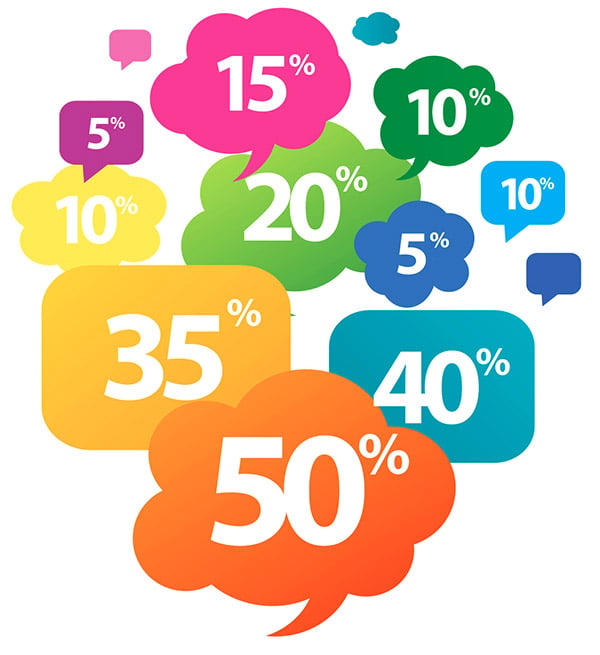 Haggling on monthly mobile phone contracts can slash the price you pay. If you have a contract deal and you're nearing the end of your fixed term, the network will be frantic to keep you, so it's the best time to haggle. Long-term customers have a better chance at success here.
Haggling on monthly mobile phone contracts can slash the price you pay. If you have a contract deal and you're nearing the end of your fixed term, the network will be frantic to keep you, so it's the best time to haggle. Long-term customers have a better chance at success here.
Our poll found the best mobile providers to haggle with are Virgin and Vodafone. See our guide on How To Negotiate to help you get a better deal. Bear in mind though it's harder to haggle on a contract for a new phone, especially one in as much demand as new iPhones are.
Get a cheap Sim-only deal
Already got an iPhone? If you're out of contract, you could stand to make serious savings by switching to a Sim-only tariff.
The main benefit of switching is that you won't pay an extra monthly cost for a handset - so your tariff price and overall costs will drop significantly.
Alternatively, if you're looking to buy a new iPhone and have the cash for the handset from Giffgaff (from £499 for the iPhone 6s* or £659 for the iPhone 6s Plus*) it's worth considering.
Find our up-to-date Sim-only top picks in the Cheap Mobiles guide.
Don't overestimate how much data you need

Smartphones are fast becoming the norm. If you use your phone to constantly search the web, you need to watch the amount of data you use. As more data-hungry apps are released, it's fair to question whether you'll chomp through your data allowance quickly each month and wind up paying a wedge for more.
For checking emails, looking at Facebook and watching the odd YouTube video, 1GB should be more than enough.
To give you a rough idea, MSE's Eesha says: "I have 1GB a month. I tend to use close to this limit but never go over. I generally just use Whatsapp, Facebook, emails, and check deals apps like Groupon, Wowcher, Quidco and the Paypal app."
Downloading videos, TV shows or other web-heavy apps may take you over your limit and cause you to incur heavy charges.
If you're worried about data use, try using the free Onavo app mentioned below.
Sneaky app gets you more from your data allowance
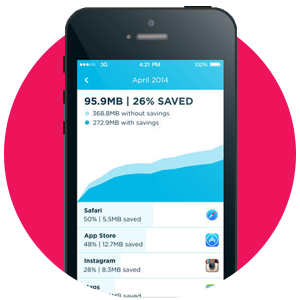
Heavy downloaders could end up paying out BIG if they exceed their download allowance. Some providers charge as much as 20p/MB if you go over your inclusive data limit.
Try the free app Onavo, which says it compresses data when web-browsing and using other apps such as Facebook and Twitter. This means the same amount of surfing will only use a fraction of your data allowance, avoiding any hefty fees.
More info about Onavo
Sell your old phone to fund your new one
Selling your old mobile could help you recoup some of the cost of your new one. There are two ways you can do this:
Flog your mobile for more
There's huge demand for secondhand iPhones, so it's very much a seller's market. Perhaps unsurprisingly, eBay* should be your first port of call if you're willing to put in a bit of (virtual) legwork. At the time of writing, an unlocked 16GB iPhone 5s in decent nick could fetch around £180, and an 64GB iPhone 6 about £350.
Flog your mobile in a hurry
If you want a guaranteed amount of cash to put towards your next handset (or something else entirely), mobile recycling sites are an easy option.
To save you the hassle of going door-to-door, our MobileValuer tool compares how much each of the big players will offer for your old phone, whether it's working or broken. Usually you'll get a bit less than what you'd get if you listed the phone on eBay. For example, at the time of writing, the most you'd get for recycling a 64GB iPhone 6 is £260.
Don't forget insurance saving
Accidents can and do happen. Because mobiles are worth so much more to us these days (and they cost a lot more), if you lose 'em, break 'em or have 'em nicked, it can be costly to replace them.

Insurers play on this fear with hefty prices and unnecessary cover. Yet you can get cheap insurance for your iPhone from £70/year.
Read the full Mobile Insurance guide for full info and best buys.
If your phone's stolen...
Report it to the police and let your network know as soon as possible.This is important to prevent unauthorised use of your service, and may also be critical for insurance claims.
Check coverage in your area
The quality of the signal you'll receive will depend on where you are. Across all the networks, big cities and towns should all have a decent 3G signal - and some may have 4G - while those in rural areas can struggle.
All the networks have coverage checkers on their sites, but these tend to be optimistic. Ofcom's research into 4G constitutes the most up-to-date objective info we have on coverage - view its Mobile coverage checker to see what signal strength will be like in your area.
Consider a secondhand or refurbished handset
Don't forget to check out secondhand models on eBay*. As an example, at the time of writing you can get a used 16GB iPhone 6s in good condition for around £400 on eBay, compared with a new one from Apple which costs £539. Make sure it's unlocked (see Mobile Unlocking for full info) though, so you can take advantage of super-cheap Sim-only tariffs.
It's also possible to get refurbished handsets on eBay or through some resellers online. These work just as new phones and come in new condition, plus they typically come with a manufacturer's warranty. Bear in mind that used handsets on eBay usually don't come with warranties.
Watch out for auto-insurance
Some retailers automatically add insurance to a mobile phone contract when you sign up online, regardless of whether you want it or not.
This has stung quite a few MSE users, so be sure to read all the small print, thoroughly, before clicking the 'buy' button.
These insurance policies are normally more expensive than standard insurance, and if there's no 'opt out' option - you must remember to cancel it as soon as you get your phone.
If you cancel over the phone, ask the company to email you with confirmation of the cancellation, so you have it in writing too. Read the full Mobile Insurance guide for how to get the cheapest standalone mobile cover.
Protect your iPhone and its data
Losing your data, photos and contacts is a nightmare. Yet there are a number of easy ways to protect your mobile and data, many of which are free.

Regardless of how expensive your phone is, the info you've got stored on it can also be mega-valuable, and it's a nightmare (and probably a lost cause) to retrieve contacts, photos, apps, games, messages back after losing a handset.
To beat this, free services can back up this crucial info before you lose it.
Back up to the web
Back up your computer
Via your network provider
Old school pen and paper route
Make use of free Wi-fi
Rather than using up your monthly download allowance, when you're out and about, find a free Wi-fi hotspot to use instead.
McDonald's, Starbucks and Wetherspoon pubs all offer free wi-fi access, plus check My Hotspots, Free Hotspot, and Hotspot Locations for more. There are thousands of free, legal wireless hotspots around the UK. See free Wi-fi for more info.
Get extra cashback on top
It's often possible to grab extra cashback on top when you sign up for a mobile phone contract. To get it, you need to sign up via a specialist cashback website rather than directly with the network provider. Cashback websites use affiliate links to generate revenue, so if they get paid when you sign up, you'll get paid.
Unfortunately this cash is never guaranteed, as sometimes cashback sites don't track deals in progress, so it's generally best to pick the right tariff first and view any cashback as an added extra. To find out more about how these sites can pay you, and how you can make the most of them, read the full Cashback Sites guide.
Retailer redemption cashback. Don't confuse cashback sites with cashback you can get directly through a retailer, through redemption. This kind of cashback isn't straightforward, and can often require you to send several copies of your monthly bills on certain days.
How to complain about your mobile provider
The mobile industry doesn't have the best customer service reputation and while a provider may be good for some, it can be hell for others. Common problems include limited network coverage, slow data speeds, unexpected charges and more. It's always worth complaining to your provider first, but if you have no success, then…